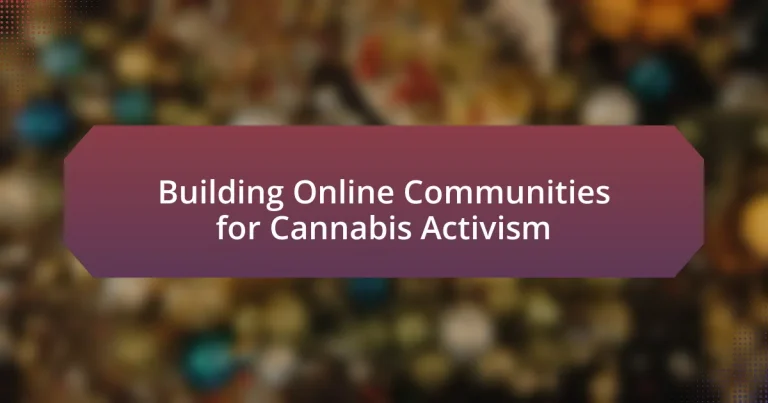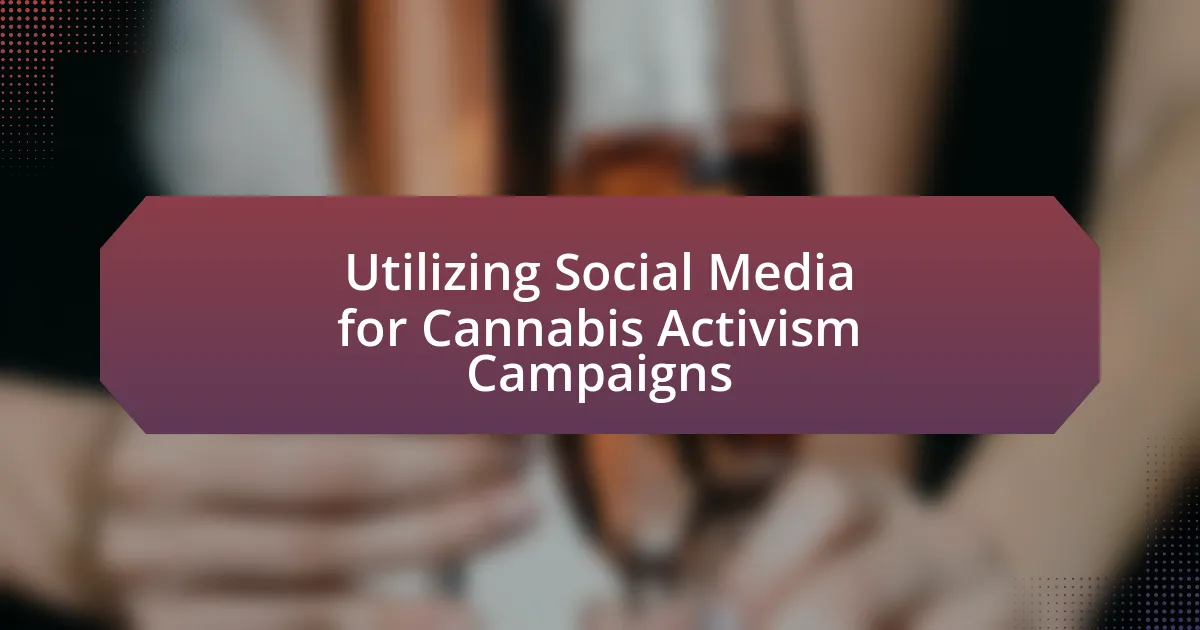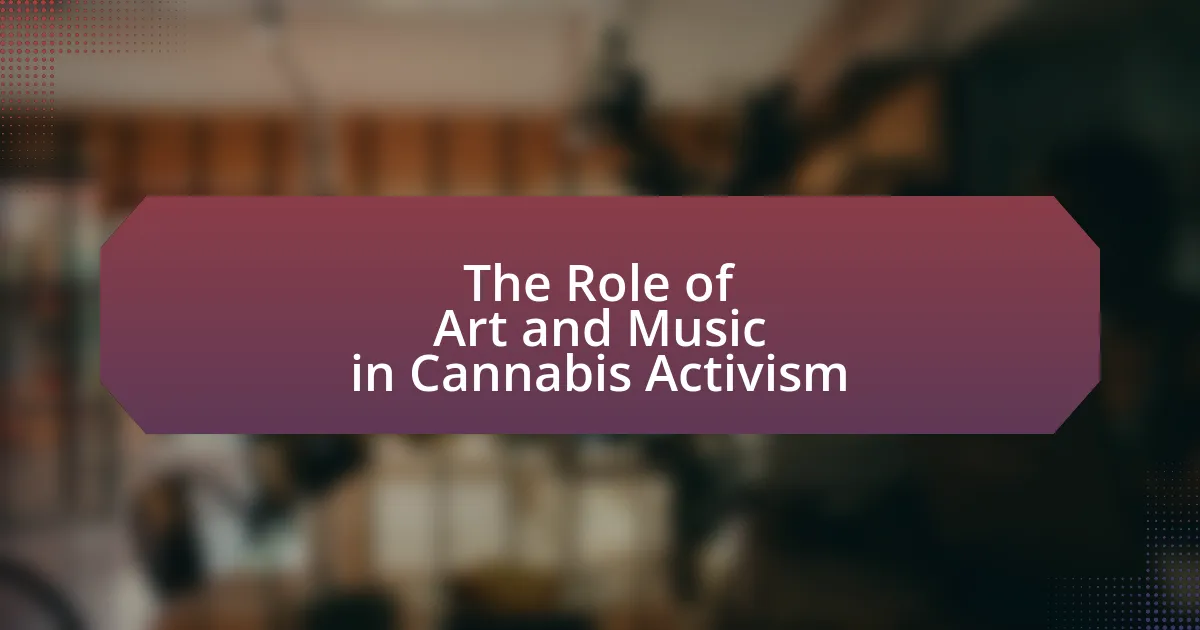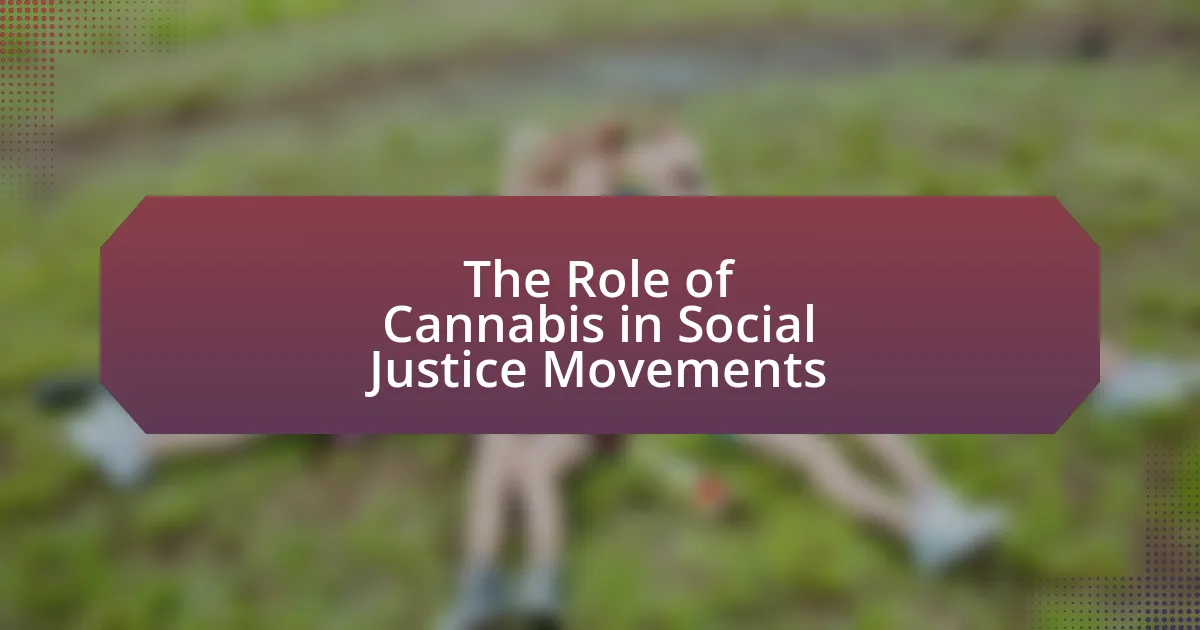Online communities for cannabis activism are digital platforms that facilitate advocacy for cannabis legalization, education, and reform. These communities, found on platforms like Reddit and Facebook, enable discussions, resource sharing, and grassroots organizing to influence public policy and perceptions of cannabis use. The article explores how these communities support activism through education, mobilization, and engagement, while also addressing challenges such as misinformation and legal restrictions. It highlights effective strategies for building inclusive communities, fostering participation, and measuring success in cannabis advocacy efforts.
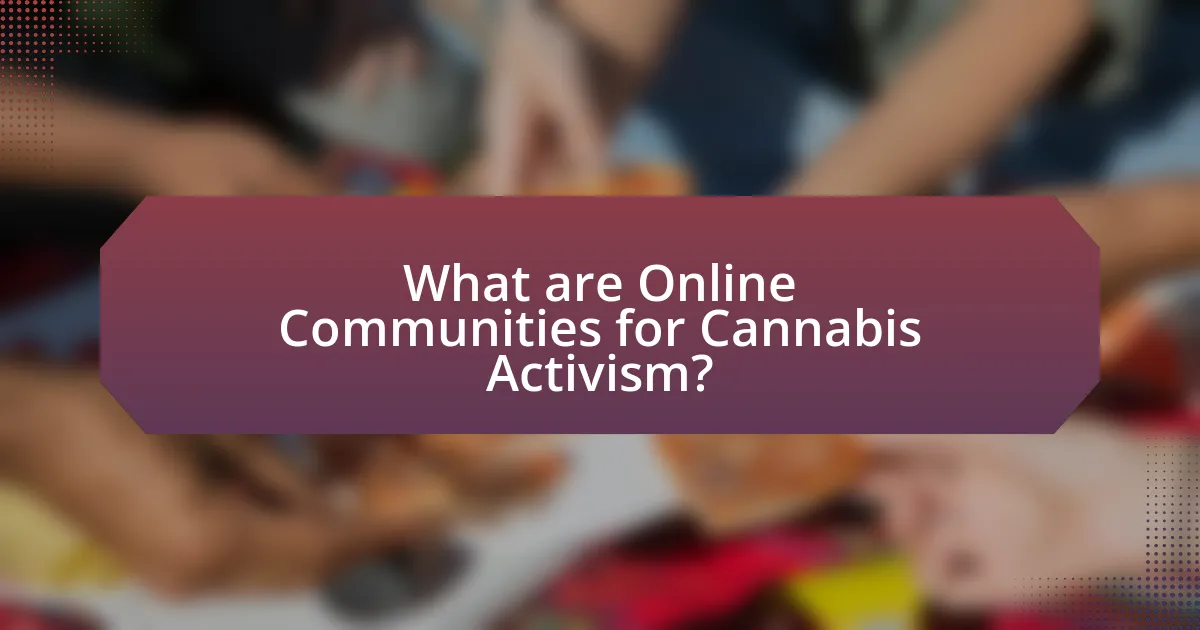
What are Online Communities for Cannabis Activism?
Online communities for cannabis activism are digital platforms where individuals advocate for cannabis legalization, education, and reform. These communities facilitate discussions, share resources, and mobilize efforts to influence public policy and societal perceptions regarding cannabis use. For example, platforms like Reddit and Facebook host groups dedicated to cannabis activism, allowing members to exchange information, organize events, and support legislative changes. The effectiveness of these online communities is evidenced by the growing number of states that have legalized cannabis, reflecting the impact of collective advocacy efforts.
How do online communities support cannabis activism?
Online communities support cannabis activism by providing platforms for education, advocacy, and mobilization. These digital spaces enable activists to share information about cannabis laws, health benefits, and social justice issues related to cannabis use. For instance, organizations like NORML (National Organization for the Reform of Marijuana Laws) utilize social media and forums to disseminate research and updates on legislative changes, fostering a well-informed community. Additionally, online communities facilitate grassroots organizing, allowing individuals to coordinate events, campaigns, and petitions, which can lead to significant policy changes, as evidenced by the legalization movements in various states driven by collective online efforts.
What platforms are most effective for cannabis activism communities?
Social media platforms such as Facebook, Instagram, and Twitter are most effective for cannabis activism communities. These platforms facilitate widespread engagement, allowing activists to share information, mobilize supporters, and organize events. For instance, Facebook groups enable targeted discussions and community building, while Instagram’s visual content can effectively raise awareness through impactful imagery and stories. Additionally, Twitter’s real-time communication allows for rapid dissemination of news and updates related to cannabis legislation and activism efforts. According to a 2021 study by the Pew Research Center, 69% of adults in the U.S. use Facebook, making it a crucial platform for reaching a large audience in cannabis advocacy.
How do these communities foster engagement and participation?
These communities foster engagement and participation by creating inclusive platforms that encourage dialogue and collaboration among members. They utilize social media, forums, and webinars to facilitate discussions on cannabis-related issues, allowing individuals to share experiences and knowledge. For instance, platforms like Facebook groups and Reddit threads enable real-time interaction, which enhances community bonding and motivates members to participate actively. Additionally, these communities often organize events, such as virtual rallies or educational workshops, which provide opportunities for members to engage in activism and advocacy, thereby increasing overall participation.
Why is building an online community important for cannabis activism?
Building an online community is crucial for cannabis activism because it fosters collective action and amplifies voices advocating for policy change. Online platforms enable activists to share information, mobilize supporters, and coordinate efforts efficiently, which is essential in a landscape where cannabis laws vary significantly across regions. For instance, the National Organization for the Reform of Marijuana Laws (NORML) has utilized online communities to engage over 200,000 supporters, facilitating grassroots campaigns that have led to legislative changes in multiple states. This demonstrates that a strong online presence not only raises awareness but also drives tangible results in cannabis reform efforts.
What role does community play in advocacy and education?
Community plays a crucial role in advocacy and education by fostering collective action and shared knowledge among individuals. In the context of cannabis activism, communities provide a platform for members to exchange information, mobilize support, and amplify their voices on policy changes. Research indicates that grassroots movements, often driven by community engagement, can significantly influence public opinion and legislative outcomes, as seen in the legalization efforts across various states in the U.S. This collective effort not only enhances awareness but also empowers individuals to participate actively in advocacy initiatives, leading to more informed and effective educational campaigns.
How can online communities influence public perception of cannabis?
Online communities can significantly influence public perception of cannabis by facilitating information sharing, fostering discussions, and shaping narratives around its use and legalization. These platforms allow individuals to share personal experiences, which can humanize cannabis use and counteract negative stereotypes. For instance, studies have shown that social media campaigns advocating for cannabis legalization have led to increased public support, with a 2019 survey indicating that 66% of Americans favor legalization, partly due to online advocacy efforts. Additionally, online communities can mobilize grassroots activism, creating a collective voice that pressures policymakers and shifts societal attitudes.
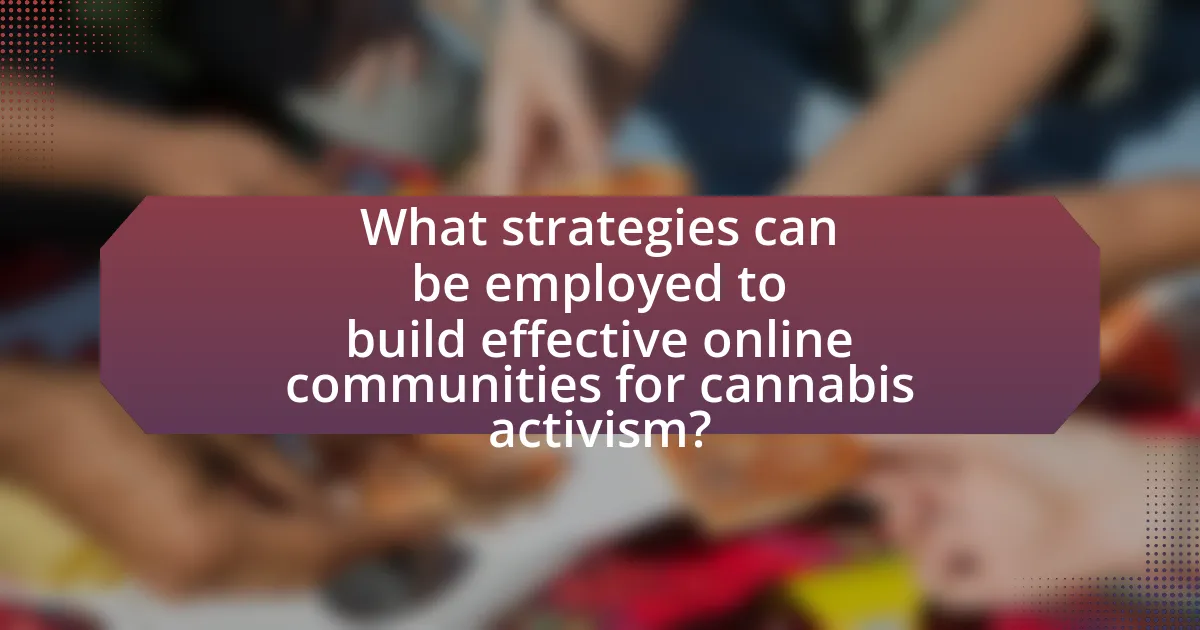
What strategies can be employed to build effective online communities for cannabis activism?
To build effective online communities for cannabis activism, organizations should focus on creating inclusive platforms that encourage open dialogue and education. Engaging content, such as informative articles, webinars, and interactive discussions, fosters participation and knowledge sharing among members. Research indicates that communities with diverse content and active moderation see higher engagement rates, as evidenced by a study from the Pew Research Center, which found that 70% of users value community support and information sharing in online spaces. Additionally, leveraging social media channels to amplify voices and connect with broader audiences can enhance visibility and mobilization efforts, as demonstrated by successful campaigns that utilized platforms like Instagram and Twitter to raise awareness and drive action.
How can leaders cultivate a sense of belonging in these communities?
Leaders can cultivate a sense of belonging in cannabis activism communities by fostering inclusive environments that encourage participation and open dialogue. By actively engaging members through regular communication, leaders can create a platform where individuals feel valued and heard. Research indicates that communities with strong social ties and shared values enhance member retention and satisfaction, as seen in studies on community engagement (McMillan & Chavis, 1986). Additionally, implementing collaborative projects and recognizing individual contributions can further strengthen the sense of belonging, as members see their efforts directly impacting the community’s goals.
What practices encourage inclusivity and diversity within cannabis activism communities?
Practices that encourage inclusivity and diversity within cannabis activism communities include actively promoting diverse leadership, implementing equitable access to resources, and fostering open dialogue among members. Diverse leadership ensures representation from various backgrounds, which can lead to more comprehensive advocacy strategies. Equitable access to resources, such as funding and educational materials, allows individuals from underrepresented groups to participate fully in activism. Additionally, fostering open dialogue creates a safe space for sharing experiences and perspectives, which enhances understanding and collaboration. These practices are supported by studies indicating that diverse teams are more innovative and effective in problem-solving, thus benefiting the overall goals of cannabis activism.
How can community guidelines enhance member interactions?
Community guidelines enhance member interactions by establishing clear expectations for behavior and communication within the group. These guidelines promote respectful dialogue, reduce conflicts, and foster a sense of belonging among members. For instance, research indicates that communities with well-defined rules experience 30% fewer disputes, leading to more productive discussions and collaboration. By creating a safe environment, community guidelines encourage members to share their experiences and insights related to cannabis activism, ultimately strengthening the community’s collective voice and impact.
What types of content are most effective in engaging community members?
Interactive content, such as polls, quizzes, and live Q&A sessions, is most effective in engaging community members. This type of content encourages participation and fosters a sense of belonging among members. For instance, a study by HubSpot found that interactive content generates twice as many conversions as passive content, highlighting its effectiveness in driving engagement. Additionally, user-generated content, including testimonials and shared experiences, also significantly enhances community involvement, as it allows members to contribute and feel valued within the community.
How can educational resources be integrated into community discussions?
Educational resources can be integrated into community discussions by utilizing platforms that facilitate knowledge sharing and engagement among members. For instance, online forums and social media groups dedicated to cannabis activism can host webinars, share articles, and provide access to research studies that inform community members about cannabis legislation, health benefits, and social justice issues. A study by the Pew Research Center indicates that 69% of adults in the U.S. use social media, making it an effective medium for disseminating educational content and fostering discussions. By encouraging members to share their insights and experiences related to cannabis, communities can create a collaborative learning environment that enhances understanding and advocacy efforts.
What role do events and campaigns play in community engagement?
Events and campaigns serve as critical mechanisms for fostering community engagement by providing platforms for interaction, education, and mobilization. They create opportunities for individuals to connect over shared interests, such as cannabis activism, thereby strengthening community bonds. For instance, organized events like rallies or educational workshops can increase awareness and participation in advocacy efforts, leading to a more informed and active community. Research indicates that communities engaged through events are more likely to collaborate on initiatives, as evidenced by the success of campaigns that have mobilized thousands for legislative changes in cannabis policy.
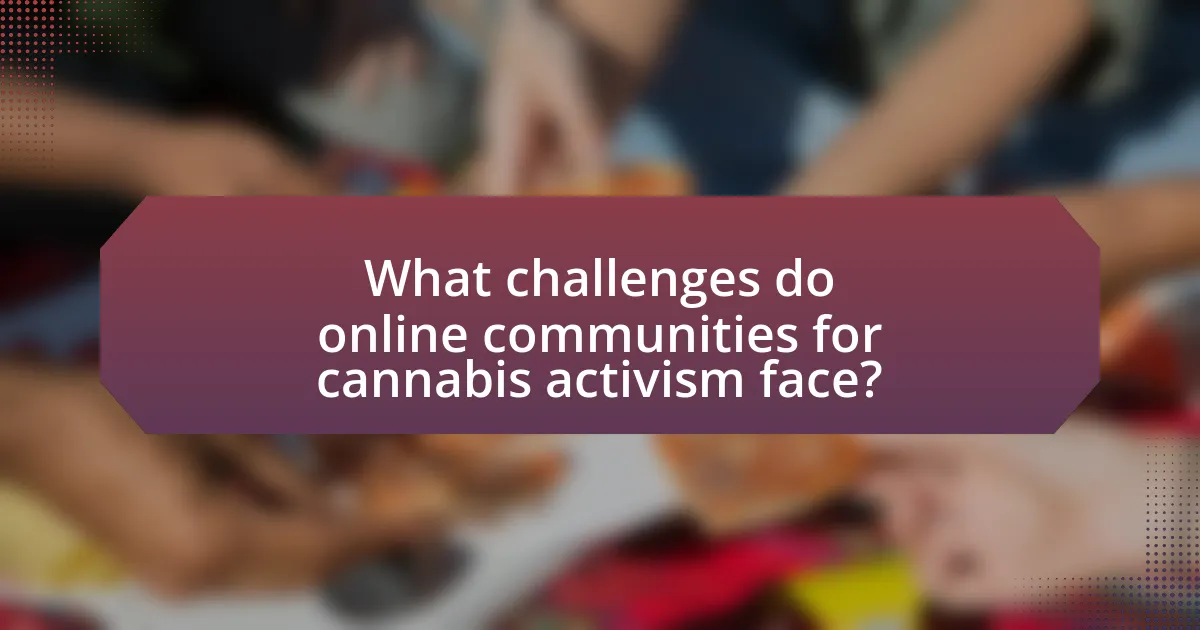
What challenges do online communities for cannabis activism face?
Online communities for cannabis activism face significant challenges, including legal restrictions, misinformation, and platform censorship. Legal restrictions arise from varying laws regarding cannabis use and advocacy across different jurisdictions, which can lead to the shutdown of online platforms or the removal of content. Misinformation is prevalent, as activists often combat false narratives about cannabis that can undermine their efforts. Additionally, platform censorship occurs when social media companies enforce strict policies against drug-related content, limiting the reach and effectiveness of cannabis activism campaigns. These challenges hinder the ability of online communities to mobilize support and disseminate accurate information effectively.
How can misinformation be addressed within these communities?
Misinformation within cannabis activism communities can be addressed through education and fact-checking initiatives. Implementing regular workshops and webinars led by experts can provide accurate information about cannabis, its benefits, and legal status, thereby countering false narratives. Additionally, establishing a dedicated team to monitor and fact-check claims made within the community can help identify and correct misinformation promptly. Research indicates that communities with active misinformation management strategies, such as the use of fact-checking websites, experience a significant reduction in the spread of false information, enhancing overall trust and engagement among members.
What strategies can be implemented to combat stigma and stereotypes?
To combat stigma and stereotypes surrounding cannabis use, education and awareness campaigns can be implemented. These campaigns should focus on providing accurate information about cannabis, its benefits, and its risks, countering misinformation that fuels stigma. Research indicates that informed communities are less likely to hold negative stereotypes; for instance, a study published in the Journal of Cannabis Research found that educational interventions significantly reduced stigma among participants. Additionally, fostering open dialogues within online communities can create safe spaces for sharing personal experiences, which humanizes cannabis users and challenges prevailing stereotypes.
How can communities ensure a safe and respectful environment for all members?
Communities can ensure a safe and respectful environment for all members by establishing clear guidelines and enforcing them consistently. These guidelines should include policies against harassment, discrimination, and hate speech, which are essential for fostering inclusivity. Research indicates that communities with well-defined codes of conduct experience lower instances of conflict and higher member satisfaction. For example, a study by the Pew Research Center found that online communities with active moderation and clear rules report a 30% decrease in negative interactions. Additionally, providing training for community leaders on conflict resolution and promoting open communication channels can further enhance safety and respect among members.
What legal and regulatory issues impact online cannabis activism communities?
Legal and regulatory issues significantly impact online cannabis activism communities by influencing the freedom of expression, content moderation, and the ability to organize. In jurisdictions where cannabis remains illegal, activists may face legal repercussions for promoting cannabis use or cultivation, which can lead to censorship or the removal of content from platforms. Additionally, social media companies often implement strict policies against drug-related content, which can hinder the visibility and reach of activism efforts. For instance, the Communications Decency Act in the United States allows platforms to remove content they deem inappropriate, affecting how cannabis activism is communicated online. Furthermore, varying state laws regarding cannabis can create confusion and inconsistency in how online communities operate, leading to potential legal challenges for organizers and participants.
How can communities navigate varying laws and regulations across regions?
Communities can navigate varying laws and regulations across regions by establishing clear communication channels and utilizing legal resources to stay informed. By creating platforms for sharing information, communities can disseminate updates on local laws, compliance requirements, and advocacy strategies. For instance, organizations like the National Organization for the Reform of Marijuana Laws (NORML) provide resources and legal updates that help communities understand the specific regulations in their areas. Additionally, engaging with local legal experts can offer tailored guidance, ensuring that community members remain compliant while advocating for their rights.
What resources are available to help communities stay informed about legal changes?
Communities can stay informed about legal changes through various resources such as government websites, legal aid organizations, and advocacy groups. Government websites provide official updates on legislation and regulations, ensuring access to accurate information. Legal aid organizations often offer newsletters and alerts regarding changes in laws that affect specific communities, including cannabis-related legislation. Advocacy groups, particularly those focused on cannabis activism, frequently publish reports, host webinars, and maintain social media channels to disseminate timely information about legal developments. These resources collectively empower communities to remain knowledgeable and engaged in the evolving legal landscape.
What are best practices for sustaining an online community focused on cannabis activism?
To sustain an online community focused on cannabis activism, it is essential to foster engagement through regular, informative content and active participation. Engaging members with educational resources, updates on legislation, and advocacy opportunities encourages ongoing interaction. Additionally, creating a safe and inclusive environment where diverse voices are heard promotes trust and loyalty among community members. Research indicates that communities with clear guidelines and active moderation experience higher retention rates, as members feel respected and valued. Furthermore, leveraging social media platforms to amplify community messages can enhance visibility and attract new members, thereby sustaining growth and influence in the cannabis activism space.
How can community leaders maintain engagement over time?
Community leaders can maintain engagement over time by fostering consistent communication and creating opportunities for participation. Regular updates through newsletters, social media, and community forums keep members informed and involved. Additionally, organizing events, both online and offline, encourages active participation and strengthens community bonds. Research indicates that communities with regular interaction and diverse engagement opportunities see higher retention rates, as evidenced by a study from the Community Tool Box, which highlights the importance of ongoing involvement in sustaining community interest and commitment.
What metrics should be used to measure community success and growth?
To measure community success and growth in cannabis activism, key metrics include member engagement, growth rate, retention rate, and impact metrics. Member engagement can be assessed through participation in discussions, events, and social media interactions, indicating the community’s vibrancy. Growth rate, calculated by the increase in membership over time, reflects the community’s expanding reach. Retention rate, which measures the percentage of members who remain active over a specific period, indicates the community’s ability to maintain interest and involvement. Impact metrics, such as the number of successful campaigns or initiatives launched, provide concrete evidence of the community’s effectiveness in achieving its goals. These metrics collectively offer a comprehensive view of community health and progress in cannabis activism.
